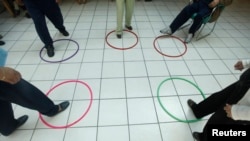Alzheimer’s disease begins with mild memory impairment. There are currently no effective treatments for the neurodegenerative disease, which causes severe dementia. But researchers at Johns Hopkins University in the U.S. state of Maryland are hopeful that a generic drug now used to treat seizures can improve memory in the early stages of Alzheimer's, even reversing the condition.
Levetiracetam, which goes by the brand name Keppra, is part of the drug arsenal used to treat epilepsy. The anti-seizure medicine seems to quiet the part of the brain called the hippocampus, that is over-activated in those with Alzheimer’s. The hippocampus is involved in memory.
Arnold Bakker, a professor of psychiatry at Johns Hopkins, says a recent study has helped doscover the drug’s newfound benefits.
“And what the medication does is it normalizes this increased activation, this dysfunctional activation," he said. "And when you do that, it turns out that you improve their memory function. People who take the medication, [their] memory improved compared to when they are not on the medication.”
The study, which Bakker conducted with colleagues, involved 84 participants, 17 of whom were normal, healthy older adults. The others had symptoms of pre-dementia. The average age of the subjects was 70.
Researchers found there was a significant improvement on memory tests in those given a very low dose of the drug - between 1/10th and 1/15th of the dose used to treat epilepsy - compared to participants who got placebo.
Bakker hopes that levetiracetam might be able to stop the mental decline seen in patients suspected of having Alzheimer’s.
“The idea is to treat [Alzheimer's] as early as possible, to prevent the onset of brain damage that results from the disease process,” he said.
Bakker says the long-term benefit of the drug still needs to be established, but he is excited that a treatment for Alzheimer’s may have been found.
“You know, I am a research scientist so I am always very careful," he said. "We need to do some more studies but so far, this is extremely promising as far as I am concerned and we are very excited about it.”
The medication dose needed to treat Alzheimer’s is very small, but Bakker says it is currently only available in the higher dose used for epilepsy treatment.
A study of the drug was published in the journal NeuroImage: Clinical.




